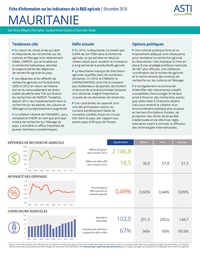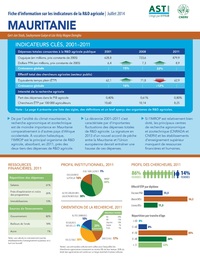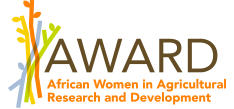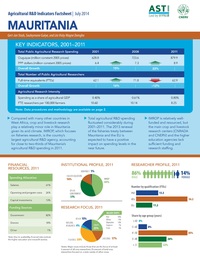Authors:
Léa Vicky Magne Domgho, Souleymane Guèye et Gert-Jan Stads
Year:
2018
Publisher
International Food Policy Research Institute.
Back to:
Key trends
Mauritanie : ASTI Fiche d’information 2018
Tendances clés
En raison du climat aride qui sévit en Mauritanie, les recherches sur les cultures et l’élevage sont relativement faible. L’IMROP, qui se focalise sur la recherche halieutique, absorbe la majeure partie des dépenses de recherche agricole du pays.

Mauritanie : ASTI Fiche d’information 2017
Volatilité des dépenses
Authors:
Léa Vicky Magne Domgho, Souleymane Guèye, and Gert-Jan Stads
Year:
2017
Publisher
International Food Policy Research Institute
Back to:
Spending volatility
Compared with many other countries in West Africa, crop and livestock research play a relatively minor role in Mauritania given its arid climate. IMROP, which focuses on fisheries research, accounted for the bulk of the country’s agricultural research spending in 2014. IMROP’s funding, which has fluctuated considerably over time due to the expiration and renewal of various fisheries treaties with the European Union, was the main driver of significant longterm volatility in the country’s total agricultural research investment.
Mauritanie : ASTI–CNERV Fiche d’information 2014
De par l’aridité du climat mauritanien, la recherche agronomique et zootechnique est de moindre importance en Mauritanie comparativement à d’autres pays d’Afrique occidentale. À vocation halieutique, l’IMROP est le principal organisme de R&D agricole, absorbant, en 2011, près des deux tiers des dépenses de R&D agricole.
La décennie 2001–2011 s’est caractérisée par d’importantes fluctuations des dépenses totales de R&D agricole. La signature en 2013 d’un nouvel accord de pêche entre la Mauritanie et l’Union européenne devrait entraîner une hausse de ces dépenses.

Authors:
Gert-Jan Stads, Souleymane Guèye, and Léa Vicky Magne Domgho
Year:
2014
Publisher
International Food Policy Research Institute and National Livestock and Veterinary Research Center.
Back to:
Compared with many other countries in West Africa, crop and livestock research play a relatively minor role in Mauritania given its arid climate. IMROP, which focuses on fisheries research, is the country’s largest agricultural R&D agency, accounting for close to two-thirds of Mauritania’s agricultural R&D spending in 2011.
Total agricultural R&D spending fluctuated considerably during 2001–2011. The 2013 renewal of the fisheries treaty between Mauritania and the EU is expected to have a positive impact on spending levels in the near future.


